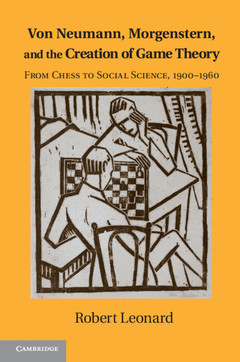Description
Von Neumann, Morgenstern, and the Creation of Game Theory
From Chess to Social Science, 1900–1960
Historical Perspectives on Modern Economics Series
Author: Leonard Robert
A reconstruction of the creation of game theory in the twentieth century by John von Neumann and Oskar Morgenstern.
Language: English
Subject for Von Neumann, Morgenstern, and the Creation of Game Theory:
Approximative price 41.42 €
In Print (Delivery period: 14 days).
Add to cart
Von Neumann, Morgenstern, and the Creation of Game Theory
Publication date: 06-2012
422 p. · 15x22.9 cm · Paperback
Publication date: 06-2012
422 p. · 15x22.9 cm · Paperback
Approximative price 117.70 €
In Print (Delivery period: 14 days).
Add to cart
In the spirit of exact science from von neumann to nash in game theory and economics
Publication date: 06-2010
424 p. · 16x22.9 cm · Hardback
Publication date: 06-2010
424 p. · 16x22.9 cm · Hardback
Description
/li>Contents
/li>Biography
/li>
Drawing on a wealth of archival material, including personal correspondence and diaries, Robert Leonard tells the fascinating story of the creation of game theory by Hungarian Jewish mathematician John von Neumann and Austrian economist Oskar Morgenstern. Game theory first emerged amid discussions of the psychology and mathematics of chess in Germany and fin-de-siècle Austro-Hungary. In the 1930s, on the cusp of anti-Semitism and political upheaval, it was developed by von Neumann into an ambitious theory of social organization. It was shaped still further by its use in combat analysis in World War II and during the Cold War. Interweaving accounts of the period's economics, science, and mathematics, and drawing sensitively on the private lives of von Neumann and Morgenstern, Robert Leonard provides a detailed reconstruction of a complex historical drama.
Introduction; Part I. Struggle and Equilibrium: From Lasker to von Neumann: 1. 'The strangest states of mind': chess, psychology and Emanuel Lasker's Kampf; 2. 'Deeply rooted yet alien': Hungarian Jews and mathematicians; 3. From Budapest to Göttingen: an apprenticeship in modern mathematics; 4. 'The futile search for the perfect formula': von Neumann's minimax theorem; Part II. Oskar Morgenstern and Interwar Vienna: 5. Equilibrium on trial: the young Morgenstern and the Austrian school; 6. Wrestling with complexity: Wirtschaftsprognose and beyond; 7. Ethics and the excluded middle: Karl Menger and social science; 8. From Austroliberalism to Anschluss: the Viennese economists in the 1930s; Part III. From War to Cold War: 9. Mathematics and the social order: von Neumann's return to game theory; 10. Ars combinatoria: writing the theory of games; 11. Morgenstern's catharsis; 12. Von Neumann's war; 13. Social science and the 'present danger': game theory and psychology at the RAND Corporation, 1946–60; Conclusion.
A Dublin native, Robert Leonard writes about the history of twentieth-century economics and the social sciences in scientific and cultural context. His work has appeared in a range of journals in economics and the history of science, including the Economic Journal, History of Political Economy and Isis. His 1995 article in the Journal of Economic Literature, from which the present book grew, won the Best Article Award of the History of Economics Society. Leonard is Professor of Economics at the Université du Québec à Montréal.
© 2024 LAVOISIER S.A.S.
These books may interest you

Behavioral EconomicsA History 93.25 €



